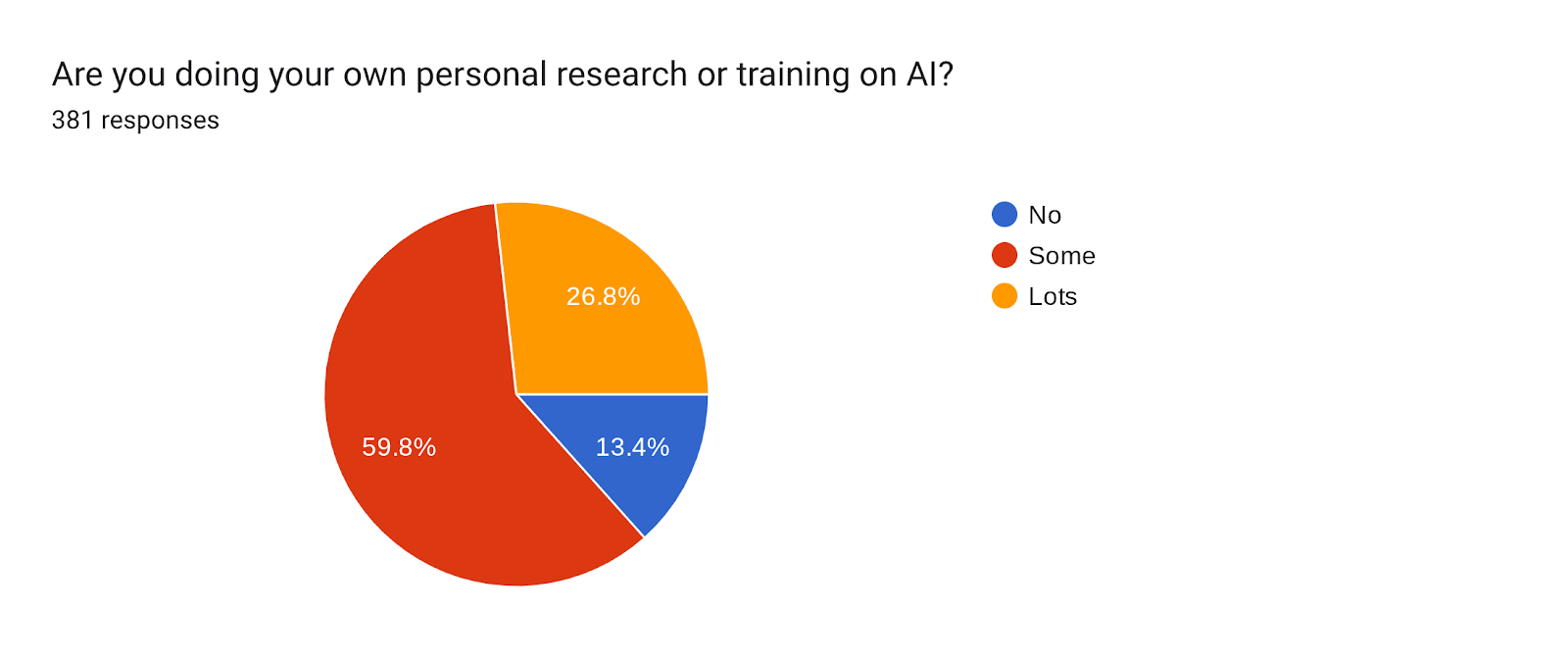We've received 384 total responses to our recent survey "Is Your Library AI Ready?"
While this is a smaller response than normal for one of our Library 2.0 surveys (it went out to our email list of 80,000 librarians and staff), we expected that given the nature of the survey. When we sent out our "Libraries and AI" survey in the spring, we had 3,690 responses, but the target audience was much more general. In this case, we anticipated that only people who felt they could report on the state of their library or library system would participate, and that seems to have been the case.
The data from the responses provides a compelling snapshot of libraries' focus on AI right now: the majority see the importance of learning about AI, providing training for it, and developing a strategy or roadmap for institutional policies and planning. But the majority are either not started or are only just beginning in those efforts. From the discussions we are having with many of you, the general feeling is: we know AI is going to be a critical factor in the services we provide and our day-to-day operations, but we're unsure of how we feel about AI, and the tasks of creating policy frameworks, plus the conditions for successful use, feel overwhelming.
There is some great work being done by some libraries, and we'll be highlighting those efforts, as well as providing lots of practical guidance, as a part of the 10-week leadership cohort program to help libraries and library systems develop a strategic AI roadmap we just announced. We are currently taking applications for that program, and we'll be continuing to offer lots of basic and advanced AI webinars for all!
What challenges do you see to training and planning for AI use by management, staff, and patrons? (Summarized by Google Forms)
- Rapid Change & Uncertainty: The swift evolution of AI tools and capabilities makes it difficult to keep up, requiring frequent updates to training and resources, and creating uncertainty about long-term implications and best practices.
- Ethical & Misinformation Concerns: Significant apprehension exists regarding intellectual property, data privacy, bias, factual accuracy, and the potential for misuse, leading to concerns about academic integrity and the spread of misinformation.
- Staff Hesitation & Buy-in: Many staff members show reluctance to learn or adopt AI due to discomfort with new technology, fear of job displacement, or personal beliefs, making it challenging to gain acceptance and facilitate training.
- Lack of Resources & Policy: Libraries face challenges with insufficient funding for AI tools and training, a lack of clear institutional policies or guidelines for AI use, and limited staff time and expertise to develop and implement AI initiatives.
- Training & Education Needs: There's a need for practical, tailored training on specific AI tools, effective prompt crafting, and responsible AI use for both staff and patrons, focusing on critical evaluation and distinguishing AI-generated content.
Anything else that you feel would be helpful for us to know about your organization's current AI use or training efforts? (Summarized by Google Forms)
- Need for Training & Guidance: Many respondents expressed a strong need for more AI training, specifically library-centric, practical, and hands-on guidance on how to safely and effectively utilize AI in their jobs and services. There's a desire for basic AI knowledge, evaluation methods, and understanding how to integrate AI into library workflows.
- Organizational Challenges & Slow Adoption: Several responses highlight challenges within their organizations, including slow leadership, lack of proactive planning, insufficient financial space for training, and internal resistance or fear among staff regarding AI's impact on job security. Some libraries are restricted by broader governmental or institutional policies.
- Ethical Concerns & Policy Development: Ethical considerations, such as privacy, bias, copyright, academic integrity, and potential negative environmental and labor impacts, are significant concerns for many. The development and approval of formal AI policies, and their ongoing review, are seen as crucial.
- Varied AI Engagement & Understanding: Responses show a wide spectrum of AI engagement, from those deeply invested and exploring its potential to those who are hesitant, skeptical, or even opposed. There's also a noted lack of clear understanding of what "AI" encompasses beyond common tools like ChatGPT.
- External Influences & Collaboration: Libraries are influenced by external factors like university-wide AI working groups, district-level policies, and training provided by state libraries or other organizations. Some are actively seeking partnerships or collaborating with instructional technologists and faculty to integrate AI.
- Ethical Concerns: Many respondents expressed concerns about the ethical use of AI, including accuracy, bias, copyright, privacy, and the potential for AI to widen the digital literacy gap or lead to a decline in critical thinking skills.
- Training and Education: There is a significant demand for more affordable or free training and workshops on AI, particularly regarding its ethical use, open-source options, and practical applications for library staff and patrons.
- Policy and Guidance: Respondents highlighted the need for clear policies and guidance on AI implementation in libraries, including addressing cheating in higher education and developing strategies for staff and public library directors.
- Budgetary Constraints: Financial limitations are a major concern, making it difficult for libraries to allocate funds for necessary AI training and resources.
- Mixed Feelings and Skepticism: While some see AI as a helpful tool for efficiency and exploration, others are skeptical, viewing it as overhyped, a "data grab," or a threat to jobs and societal intelligence.







